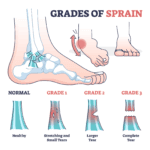Preparing for arm surgery, whether for conditions like fractures, ligament tears, or nerve issues, is a crucial step to ensure a smooth procedure and optimal recovery. Knowing what to expect before, during, and after the surgery can help reduce anxiety and improve outcomes.
Key Steps to Prepare for Arm Surgery
- Consult with Your Surgeon
Before the surgery, have a detailed consultation with your surgeon. During this discussion, your doctor will explain the type of surgery being performed, the risks, and what the recovery process will look like. Be sure to discuss any medications you are taking and if you need to stop them before surgery. - Medical Tests
Depending on your health status, your doctor may require preoperative tests such as blood tests, X-rays, or an ECG to assess your readiness for surgery. - Pre-Operative Care
Follow any guidelines provided by your surgeon, such as fasting instructions. You may be advised to stop eating or drinking after midnight before surgery to avoid complications with anesthesia. Your doctor will also guide you regarding which medications to avoid before surgery, such as blood thinners or NSAIDs, which can increase the risk of bleeding. - Transportation Arrangements
You will need to arrange for transportation to and from the hospital. After arm surgery, you may not be able to drive for some time, especially if your dominant hand is affected. Ensure you have someone who can assist you. - Home Preparation
Before your surgery, set up your home for recovery. Stock up on easy-to-prepare meals, and make sure items you will need are within easy reach to avoid overexerting your arm after surgery. Additionally, get loose-fitting clothes with wide sleeves, which will be easier to wear with post-surgical bandages or a cast. - Prepare for Post-Surgery Care
You may need assistive devices such as a splint or sling after surgery. Ask your surgeon if you will need these, and have them ready before the procedure. Additionally, speak to your healthcare provider about pain management strategies, including medications and cold therapy.
What to Expect During Arm Surgery
Depending on the type of surgery, the procedure may be done under local, regional, or general anesthesia. Here’s what to expect:
- Anesthesia
Your surgeon and anesthesiologist will determine the type of anesthesia best suited for your procedure. You will be monitored closely throughout the surgery. - Surgical Time
The length of the surgery varies depending on the complexity of the procedure. Simple procedures like fixing a fracture may take less than an hour, while complex operations, such as nerve repair, may take longer. - Post-Surgery Recovery Room
After surgery, you will be moved to a recovery room to wake up from the anesthesia. Your vital signs will be monitored, and once stable, you will be discharged or moved to a hospital room if an overnight stay is necessary.
Recovery and Post-Operative Care
- Pain Management
Pain is common after arm surgery, but it can be managed effectively with prescribed pain medications. Your doctor may also recommend ice packs to reduce swelling and inflammation. - Physical Therapy
Once cleared by your surgeon, you will likely begin a course of physical therapy to restore movement and strength to the arm. This is crucial in preventing stiffness and ensuring a full recovery. - Follow-Up Appointments
Schedule follow-up appointments as directed by your surgeon. These visits allow your doctor to monitor your healing, remove stitches or staples, and evaluate your progress. - Return to Activities
The timeline for returning to regular activities will vary depending on the surgery performed. Generally, you will be advised to avoid strenuous activities for a period of weeks to months. Your surgeon will give you specific guidelines on when you can resume work, driving, or exercise.
Frequently Asked Questions
- How long will I need to take off work after arm surgery?
The time off work depends on the complexity of the surgery. For minor surgeries, you may only need a few days to a week off, while more complex procedures could require several weeks of recovery. - Will I be able to drive after surgery?
If the surgery affects your dominant hand or arm, driving may be difficult. You should not drive until you are able to comfortably control the vehicle and avoid pain medications that can impair your judgment. - How long will I need physical therapy after surgery?
Physical therapy can last from a few weeks to several months, depending on the severity of the injury and the type of surgery. Regular therapy sessions are key to regaining full function. - How soon can I return to normal activities?
While minor activities like light walking can be resumed shortly after surgery, more strenuous activities, such as lifting or sports, will require clearance from your surgeon. The timeline varies, so follow your doctor’s advice carefully. - What should I do if I experience severe pain or complications after surgery?
Contact your surgeon immediately if you experience intense pain, signs of infection (such as fever, redness, or discharge), or any complications with your cast or bandages.
Conclusion
Preparing for arm surgery requires careful planning and understanding of the procedure. By following your surgeon’s instructions and setting up a support system at home, you can ensure a smoother surgery and recovery process. Post-operative care, including physical therapy and pain management, plays a vital role in regaining full function in your arm.





